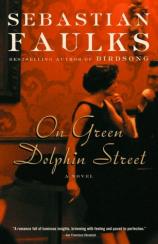Reading Group Guide
Discussion Questions
On Green Dolphin Street

1. Mary van der Linden's life is shaped by her love for three men: David Oliver, who was killed during World War II, her husband Charlie, and Frank Renzo. Do these relationships define three different kinds of passion for her? What, if anything, do the three men have in common that appeals to Mary?
2. In Chapter 2, Charlie has a blackout and is warned by his doctor against drinking too much. Why does Mary not seem to take this warning as a threat to her family's well-being, and possibly as a threat to her husband's life? Is Charlie correct in thinking that Mary "lacked the capacity to envisage disaster" [p. 34]? Is she perhaps overly optimistic, or is she correct to assume that she can save him from his troubles?
3. According to Charlie, the affluent middle-class Americans he knows are suffering from "free-floating anxiety" because "they appeared to be losing the Cold War, and were always aware of that awkward fact" [pp. 26–27]. How is Charlie, as a liaison of the British Foreign Office, affected by the atmosphere of political paranoia? How serious are his professional troubles?
4. Mary responds to the news of her mother's illness courageously because "she thought, everything would be for the best after all, because no illness, no death or treacherous cruelty could be strong enough to break up a world so fortified with love or a life so diverse and rich in the sources of its contentment" [p. 61]. How powerfully do events shake Mary's faith? How does this quote resonate for readers at the end of the novel?
5. How does Frank's experience as a journalist reflect the political mood of America in the 1950s and 1960s? Does Faulks imply that the government felt free to abuse the civil rights of its people at the time? Where do Frank's political sympathies lie?
6. What is striking about Faulks's portrayal of the social use of alcohol in the novel? What kinds of personal or social discomfort is alcohol being used to disguise or relieve? Does the widespread use of alcohol and cigarettes reveal an underlying unhappiness or even despair in the novel's social milieu?
7. What is at the core of Charlie's problems? Is there an external cause for his trouble, or is the trouble in his temperament, or his alcoholism? How accurate is Frank's view that "all Charlie's education came to nothing in the end because he could find no expression for the rage inside him. . . . It was not enough to die, there had to be self-destruction" [p. 86]?
8. In his previous novels, Sebastian Faulks has shown himself to be a brilliant chronicler of the effects of war on his characters' hearts and minds. If you have read his earlier work, how is On Green Dolphin Street different? How does he portray the effects of war in a society that is, at least officially, at peace? How are the characters in this novel shaped by their historical moment?
9. How do Frank's experiences with Vietnam, the FBI, and World War II—in which he killed six men—affect his approach to love? He has told Roxanne, his ex-wife, that killing people "felt like everything else that happens to you. It felt like nothing at all" [p. 85]. How does Frank's love for Mary change him?
10. Reviewers have commented on Faulks's ability to create convincing scenes that conjure up the sights, sounds, smells, and mood of New York and Washington in 1960. How does he create the material world of the novel? What details are used to best effect?
11. Mary realizes that Frank is "me, my inner self. It's not just him that I yearn for when I call. It's myself, my previous life, my next life" [p. 245]. Yet she also believes that marriage "means that if an impossible choice is to be made" between one's own life and one's husband's "you choose his" [p. 313]. Does her expression of her moral dilemma in her notebook [p. 245] seem compelling because it is so realistic, or because it is so idealistic? Does her ultimate decision constitute a betrayal of her deepest self? What does she mean when she writes "it's a question of being faithful to an essence" [p. 245]?
12. Some characters in On Green Dolphin Street express their awareness of a kind of existential blankness that surrounds their busy lives. Frank is troubled by "time's linear, destructive rush" [p. 270], but Mary sees this in more positive terms, telling Frank "I want you to prove to me . . . that time doesn't matter" [p. 222]. What does Mary mean by this, and is what she wants possible?
13. What are Mary's qualities as a heroine? What is admirable about her? How does her role as a wife in 1960 compare to what is expected from a wife nowadays?
14. What is the perspective on marriage expressed in Mary's thoughts in the paragraph beginning "What does it mean to love a man" [pp. 312–13]? When Charlie asks, "Will you stay with me?" [p. 313], does his question imply that he knows about Mary's affair with Frank? Is it because of her promise to Charlie at this moment that she ultimately lets go of Frank? How is the effect of this crucial exchange intensified by its setting in a seedy and frightening Moscow hotel room?
15. Why does fate take over at the end of the story? Does Faulks imply that Frank could have changed his and Mary's future if Frank's taxi had not gotten stuck in traffic? What is the view of life and love that the novel ultimately expresses?
On Green Dolphin Street
- Publication Date: January 7, 2003
- Genres: Fiction
- Paperback: 368 pages
- Publisher: Vintage
- ISBN-10: 0375704566
- ISBN-13: 9780375704567







